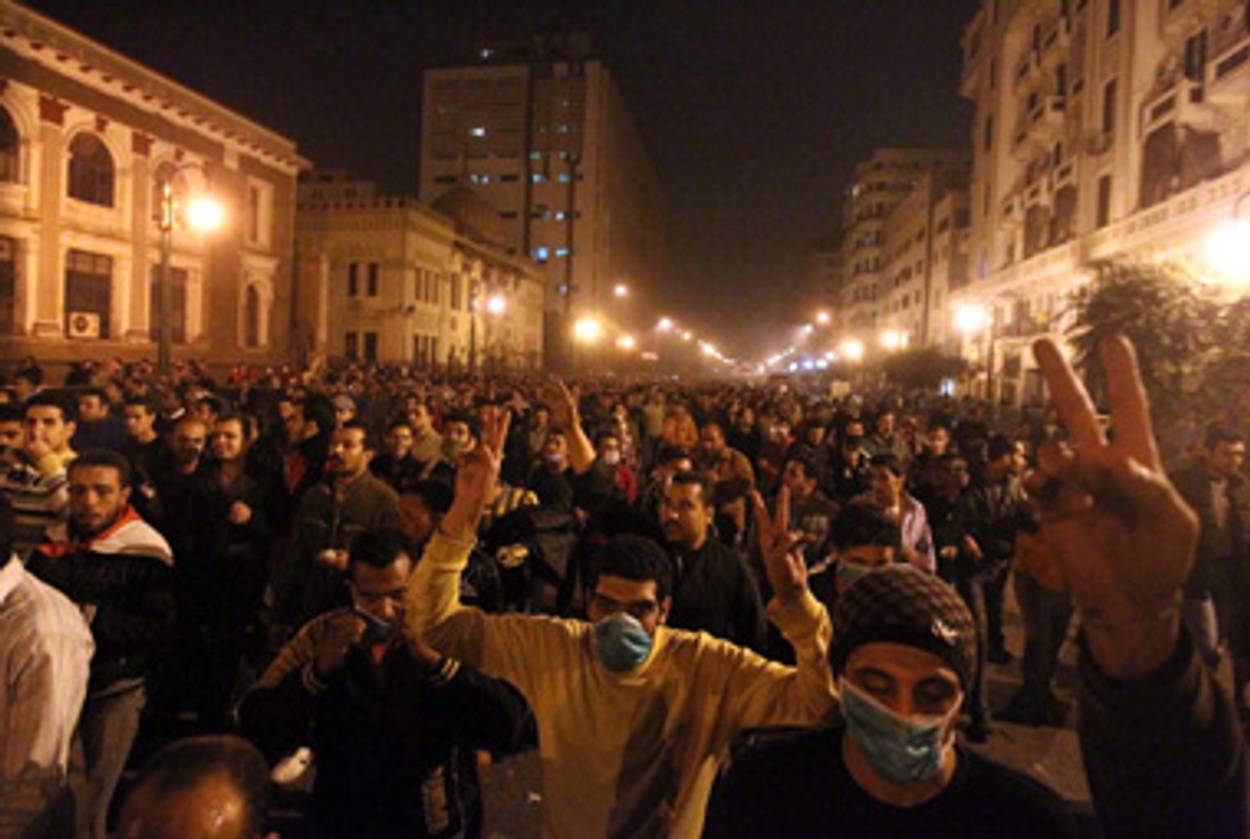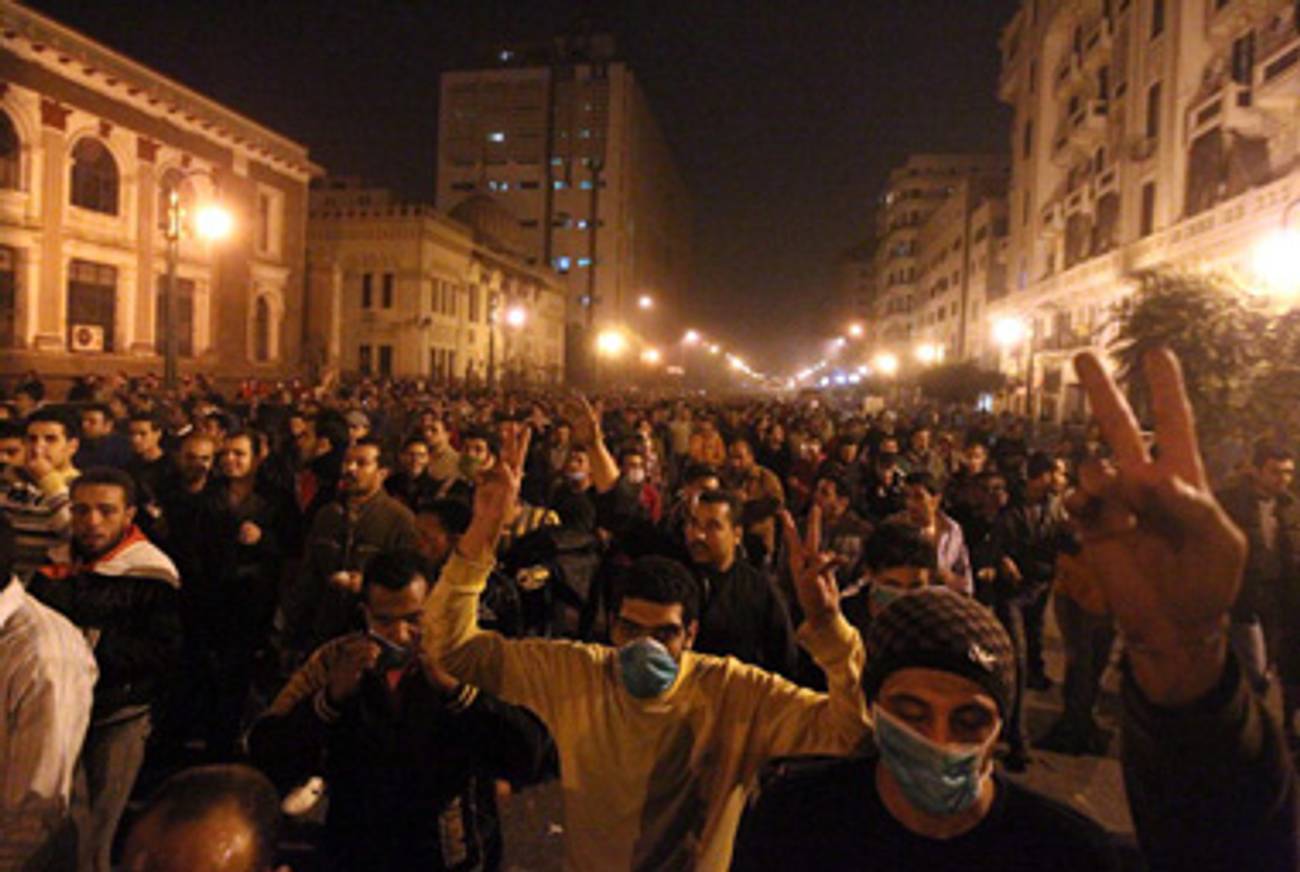U.S. Backing Away From Egypt’s Regime
Popular anti-government revolts convulse Israel’s neighbors




Are we watching the end of the 30-plus-year reign of Egyptian dictator Hosni Mubarak? He has called in the army as protests raged for their fourth straight day; Internet has been shut off; tear gas and rubber bullets have been employed, at the least; Mohamed ElBaradei, one opposition leader, has reportedly been placed under house arrest. There are dispatches aplenty: One I’d particularly recommend is on The New Yorker’s Website.
Most remarkably of all: The United States might be … siding with the protestors. White House press secretary Robert Gibbs called for an end to violence and the lifting of the Internet ban. Secretary of State Clinton insisted that “leaders need to respond” to their peoples’ calls for democracy; Sen. John Kerry, who chairs the Foreign Relations Committee, went further, explicitly calling for free and fair elections. On top of that, the Obama administration is publicly threatening to reconsider the $1.5 billion in annual U.S. military aid Egypt receives, which, as I noted earlier today, was actually the initial result of Egypt’s becoming the first Arab country to make peace with Israel.
Tunisia’s Jasmine Revolution came first, but the unrest in Egypt is a bigger deal because the Arab and even broader Muslim world has long taken its cues first and foremost from Egypt. In addition to Tunisia and Egypt, there is of course the unstable situation in Lebanon; protests in Yemen; and, today, much more placid yet very real marching for regime change in Jordan.
I just named three of the four countries that border Israel, and the two Arab states that recognize it. It is no wonder that the mood in Israel is cautiousness, the sense that these revolts represent “an earthquake,” and some concern over these regimes’ toppling—even if, broadly speaking, one watching this must greatly sympathize with the masses of young people who have known nothing but authoritarianism, agitating for democratic government. One wants to think that a democracy such as Israel would be sympathetic, but one cannot blame the country for worrying that arguably hovering in the background of the Egyptian protests is the Muslim Brotherhood, the powerful Islamist party, which is not at the protests’ forefront—yet, and maybe not ever (similarly aligned groups are most definitely poised to benefit from unrest in Yemen and likely to benefit from Tunisia’s regime change). Bruce Riedel, who wrote about Al Qaeda yesterday in Tablet Magazine, argues today that even should the Muslim Brotherhood—whose Palestinian branch is Hamas—rise to lead the protests, it should not be a cause of overmuch concern. But Israel is not likely to agree with Riedel’s analysis.
Truthfully, anyone who says they know what is going to happen next—whether Mubarak’s regime will maintain power or not, and in what form; what character the Egyptian revolt will take on—is lying. So sit tight, keep watching the news, and—if I may editorialize for a moment—cheer on, for now, the courageous youth of Egypt.
Egypt Calls In Army as Protestors Rage [NYT]
U.S. Calls for Egypt to Respond to Its People [WSJ]
U.S. to Review Aid to Egypt, WH Spokesman Says [WP]
The Taking of Kasr Al Nil [New Yorker]
Don’t Fear Egypt’s Muslim Brotherhood [Daily Beast]
Earlier: Lebanese Power Broker Supports Hezbollah
Marc Tracy is a staff writer at The New Republic, and was previously a staff writer at Tablet. He tweets @marcatracy.